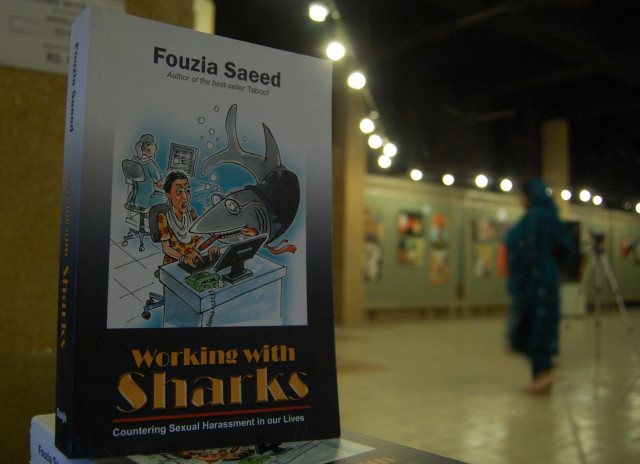For the other half: A tale of a decade-long fight against wolves
AASHA’s struggle led to enactment of anti-harassment law.

Dr Fouzia Saeed's book "Working with Sharks" displayed at launching ceremony at Lok Virsa Heritage Museum. PHOTO: MUHAMMAD JAVAID/EXPRESS
If one is to go by the reports appearing in media and highlighted by rights groups of violence against women in general and harassment at work places in particular, we are still far from the normal. Fighting the entrenched patriarchal social order out a decade back was even harder.
“It is never easy to unravel one’s vulnerabilities but it is necessary if we want to move forward,” shared author, columnist and rights campaigner, Dr Fouzia Saeed who shared her experiences while working for an international organisation with a select audience.

The experiences roused her to pen a fearless expose titled ‘Working with Sharks’ in 2012. It’s translation in Urdu ‘Bher ki Khaal Mein’ was launched here on Sunday to mark National Working Women’s Day at the Pakistan National Council of Arts. She felt an Urdu translation of the book was necessary for greater outreach.
Dr Saeed began a movement in 2001 with a team of ten women who no longer wanted to hush the daunting behavior of their male managers. Their fight led to Parliament in 2010 bidding sexual harassment a punishable crime.
“Women need to open up for the sake of the next generation of women, so when young girls embrace a career, they do not have to be disillusioned about the trustworthiness of the men around them.”
According to Dr Saeed, implementation of the law has been on the forefront of the Alliance Against Sexual Harassment (AASHA), a civil rights group that came together to give every woman the right to work with dignity.

Thanks to such civil society efforts, we now have legislation that puts checks in place to prevent harassment at workplace.
The law if implemented in true spirit can bring the scale back to an evenly balanced position.
“My department was the first to adopt the anti-harassment law and I feel more secure because of it,” shared National Highways and Motorway Police official Shahida Yasmin. “We need to encourage women to come out and build a positive and secure working environment.”
Chief guest Tehmina Durrani evoked her own struggles as a measure of fortitude and dedication of women to overcoming social barriers. “Our society encourages women to be hypocrites, to internalise their sorrow and fear without expressing it on the outside, but we need to sow seeds of change that can grow into something reinforcing and sustainable,” she said.

Veteran journalist and Human Rights Commission of Pakistan Director I.A. Rehman said that whether knee-deep in the paddy field with the blazing sun to their arched back or on a swinging chair at an air-conditioned office, women have always worked though rarely challenged tradition.
“It takes a lot of courage to speak up, to fight relentlessly and to build up a collective voice that resonates so loudly that it leaves the government no choice but to act.”
Minister for Information Pervaiz Rashid lamented about the disintegration of values since independence, recalling the time when his mother and sisters felt at ease traveling alone and attending school.
“We need to search within to dissect and understand our decline from a progressive and passionate society to one that threatens its women and breaks away from wholesome values, “he said.
Published in The Express Tribune, December 23rd, 2013.



















COMMENTS
Comments are moderated and generally will be posted if they are on-topic and not abusive.
For more information, please see our Comments FAQ